Collection: Incubator Shaker
An Incubator Shaker is a specialized laboratory instrument designed for cultivating biological samples under controlled conditions of temperature, humidity, and agitation. It combines the features of an incubator, which maintains a stable environment for growth, with a shaker that provides gentle agitation to evenly distribute nutrients and oxygen throughout the culture medium. This equipment is essential in scientific research, particularly in fields like microbiology and cell biology, where precise control over culture conditions and optimal growth environment are critical for successful experiments and studies.
How do I choose the right shaker incubator?
When choosing an incubator, several key factors should be considered and evaluated based on different types of requirements:
Experimental Needs and Applications: Firstly, it's important to clarify your experimental requirements, such as whether you need a constant temperature, humidity-controlled environment, oscillation function, or CO2 concentration control for cell culture. Different types of incubators are suitable for different experimental scenarios; for example, stacked models are space-saving, high-speed incubators are ideal for rapid growth, and CO2 incubators are suitable for cell cultures requiring controlled CO2 levels.
Space and Layout: Select the type of incubator based on the spatial layout and available space in your laboratory. For instance, stacked models conserve space, benchtop versions are suitable for smaller labs, and upright or horizontal types are more appropriate for labs needing larger capacities or specific layouts.
Features and Characteristics: Define the features and characteristics you require, such as temperature control range, humidity control, types and frequencies of oscillation, temperature control precision, etc. Different models of incubators may vary in these aspects, so choosing the right configuration that meets your experimental needs is crucial.
In conclusion, selecting an incubator should involve a comprehensive assessment of experimental needs, spatial layout, feature requirements and so on to ensure that the chosen equipment maximally supports your research endeavors.
What kind of incubator shakers do you offer?
 CO2 incubator shaker
CO2 incubator shaker
CO2 incubator shaker
CO2 incubator shaker is a laboratory equipment that integrates functions of an incubator, a shaker, and CO2 control. It cultivates cell or tissue cultures in a controlled environment of temperature and humidity, facilitating mixing through oscillation and enhancing the transfer of oxygen and carbon dioxide. CO2 incubator shakers are typically used for experiments that require maintaining specific CO2 concentrations for cell cultures, tissue engineering research, drug screening, and similar applications.
- Cell and Tissue Culture: It provides a controlled environment with precise temperature, humidity, and CO2 levels suitable for cultivating cell and tissue cultures.
- Enhanced Mixing and Oxygen Transfer: Through oscillatory motion, it improves mixing of culture media, ensuring even distribution of cells or tissues and enhancing oxygen transfer efficiency.
- Support for Cell Growth and Viability: Maintains optimal conditions for cell growth and viability by controlling CO2 levels critical for pH balance in the media.
- Applications in Research and Biotechnology: Widely used in biomedical research, drug discovery, and biotechnology applications requiring controlled culture conditions and efficient mixing capabilities.
CO2 incubator shaker plays a crucial role in maintaining ideal growth conditions for cell cultures while facilitating uniform mixing, essential for various scientific and experimental purposes.
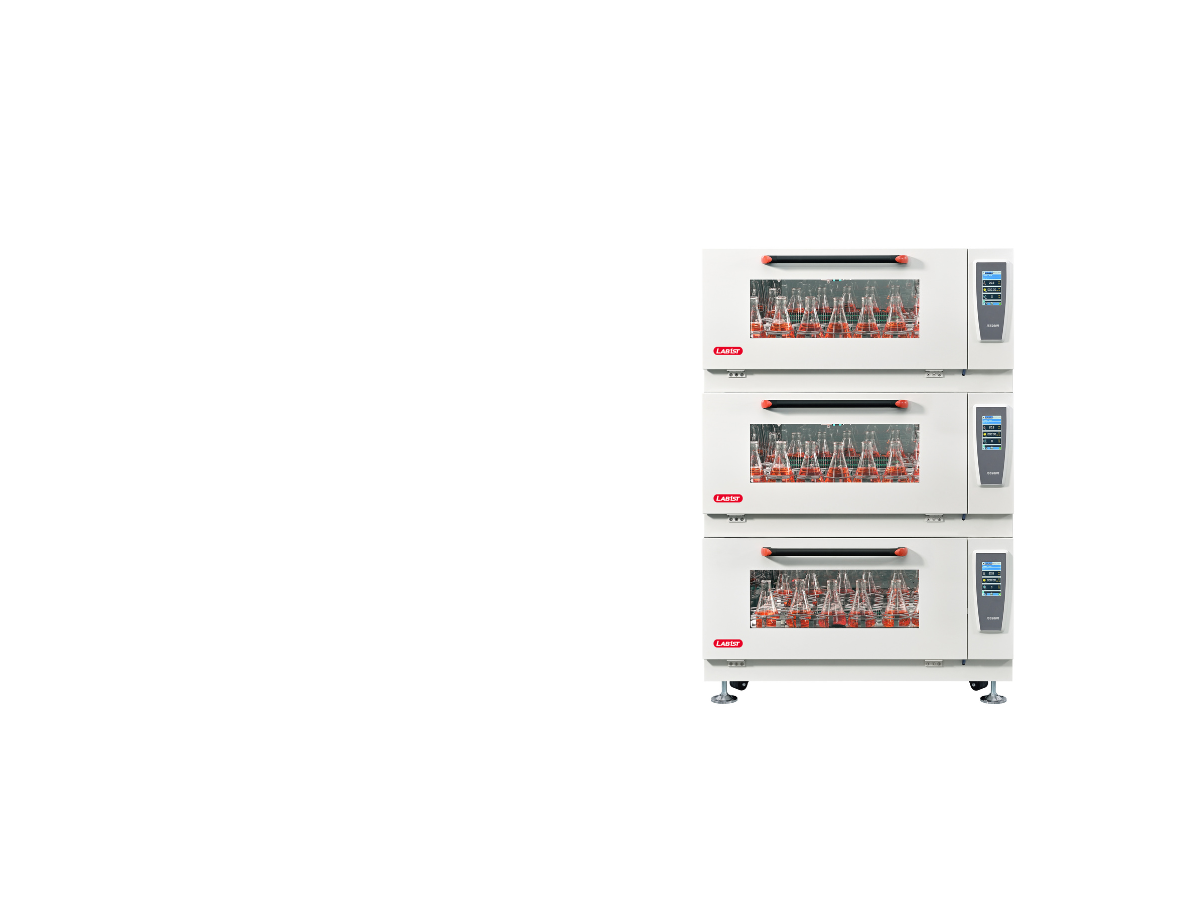 Stackable Incubator Shaker
Stackable Incubator Shaker
Stackable Incubator Shaker
The LAB1ST ISS incubator shaker is versatile enough to be used as a single unit on the floor or stacked in configurations of two or three units. It is available in three different sizes and offers both orbital and linear shaking modes (ISS165/165R), with options for 25mm or 50mm shaking throw to accommodate diverse requirements. This compact, user-friendly, and programmable incubator shaker is an invaluable tool for cultivating cells, tissues, or microorganisms in your laboratory. The "stackable" feature allows multiple units to be placed one on top of the other, optimizing space in the laboratory.
Key Features and Functions
- Incubation: The incubator component maintains a controlled environment for the growth and maintenance of biological samples. This includes precise temperature control, often with options for humidity and CO2 control, which is essential for cell culture.
- Shaking: The shaker component agitates the samples to ensure even mixing and oxygenation. This is crucial for the growth of microorganisms and cell cultures that require constant movement to remain in suspension and for optimal growth conditions.
- Stackability: The ability to stack multiple units vertically allows laboratories to maximize the use of limited space. Each unit operates independently, which means different experiments can be run simultaneously under varied conditions.
Applications
- Microbial Culture: Growing bacteria, yeast, and other microorganisms in liquid media. The shaking ensures that cells are evenly distributed and well-aerated.
- Cell Culture: Cultivating mammalian, insect, or plant cells that require a controlled environment and gentle agitation to promote healthy growth.
- Protein Expression: Used in biotechnology for growing cultures that express recombinant proteins.
- Fermentation: Small-scale fermentation studies where controlled temperature and agitation are critical for optimizing the process.
Example Usage
Imagine a biotechnology lab that needs to conduct multiple experiments involving the growth of E. coli for protein expression. With a stackable incubator shaker:
Step 1: Setup
The lab can stack several incubator shakers, each set to different temperatures and shaking speeds according to the specific requirements of each experiment.
Step 2: Loading Samples
Culture flasks or bottles containing the E. coli and growth medium are placed inside the incubator shakers.
Step 3: Operation
The incubators maintain the desired temperature, while the shakers ensure continuous agitation, promoting optimal bacterial growth and protein production.
Step 4: Monitoring and Adjustments
Monitoring the conditions through control panels and make adjustments as needed without disturbing other experiments.
Step5: Outcome
Efficient use of space allows the lab to run multiple experiments in parallel, increasing productivity and throughput.
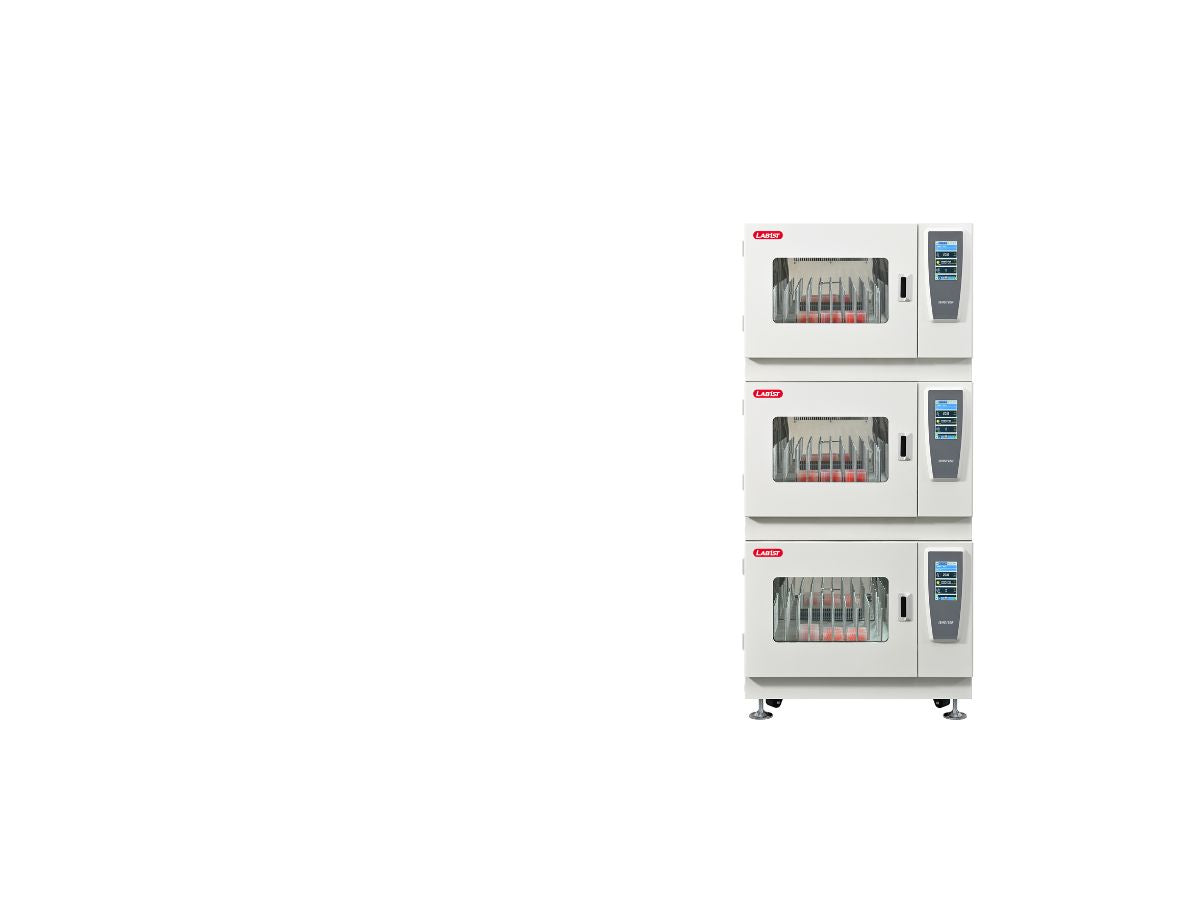 High Speed Incubator Shaker
High Speed Incubator Shaker
High Speed Incubator Shaker
High Speed Incubator Shaker combines the functions of an incubator and a shaker, featuring high shaking speeds and precise temperature control capabilities. Its main purpose is to cultivate microorganisms or cell lines in liquid culture media and facilitate mixing and enhance oxygen transfer efficiency through shaking motion. High Speed Incubator Shakers are typically capable of completing cultivation processes in shorter durations, catering to experiments requiring rapid results and high efficiency.
The function of a High Speed Incubator Shaker mainly includes the following aspects:
- Cultivating Microorganisms and Cells: It is primarily used to cultivate microorganisms (such as bacteria, yeast, etc.) or cell lines in liquid culture media. It provides a constant temperature environment and shaking function to promote growth and proliferation.
- Enhancing Mixing Efficiency: Through shaking motion, it effectively mixes the components in the culture media, ensuring uniform distribution of microorganisms or cells, and facilitating the transfer of oxygen and nutrients.
- Rapid Cultivation and Experimentation: Due to its high-speed shaking and precise temperature control capabilities, the High Speed Incubator Shaker can complete cultivation processes in shorter durations. It is suitable for experiments that require quick results and high efficiency.
- Supporting Various Experimental Needs: It is applicable to research and experiments in fields such as biology, microbiology, cell culture, and molecular biology, providing a stable cultivation environment and reliable mixing functionality for diverse experimental conditions.
The High Speed Incubator Shaker is an important laboratory device that offers efficient experimental capabilities for cultivating and studying various microorganisms and cells.
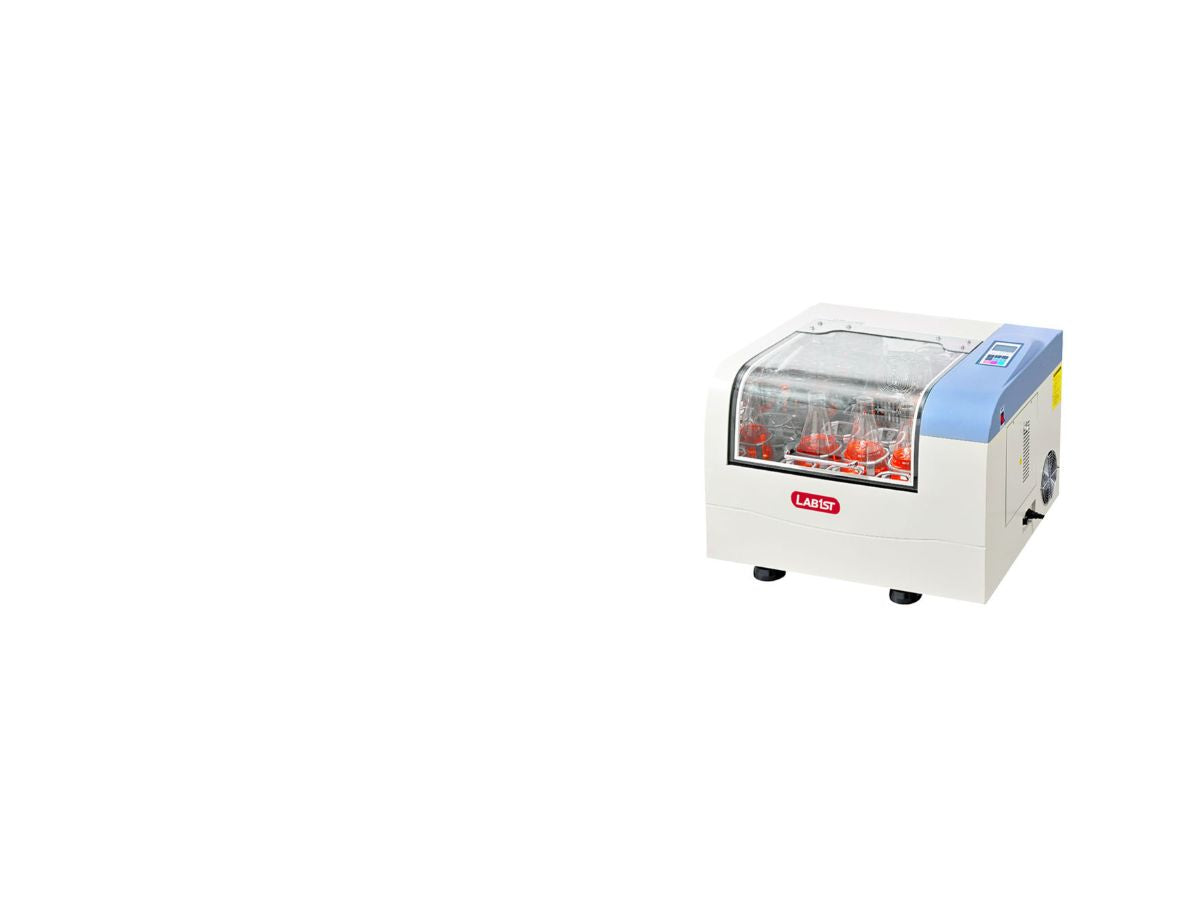 Benchtop Incubator Shaker
Benchtop Incubator Shaker
Benchtop Incubator Shaker
Benchtop Incubator Shaker is a laboratory device that combines the functions of an incubator and a shaker. Designed to be placed on a laboratory bench, it is typically used for cultivating microorganisms or cell lines in liquid culture media. It facilitates mixing and enhances oxygen transfer efficiency through shaking motion. This equipment usually includes temperature control capabilities to provide a stable cultivation environment within a controlled temperature range, supporting various experimental needs and applications.
The Benchtop Incubator Shaker serves several key functions in the laboratory:
- Cultivating Microorganisms and Cells: Primarily used for cultivating microorganisms (such as bacteria, yeast, etc.) or cell lines in liquid culture media. It promotes growth and proliferation by providing a controlled temperature environment and shaking function.
- Enhancing Mixing Efficiency: Through shaking motion, it effectively mixes the components in the culture media, ensuring even distribution of microorganisms or cells, and facilitating oxygen and nutrient transfer.
- Supporting Various Experimental Needs: Suitable for research and experiments in fields such as biology, microbiology, cell culture, and molecular biology, providing a stable cultivation environment and reliable mixing functionality for diverse experimental conditions.
- Convenient Experimental Operations: Designed as a benchtop device, it is placed on laboratory benches for easy operation and monitoring of experiments, thereby enhancing experiment efficiency and laboratory space utilization.
In summary, the Benchtop Incubator Shaker is a versatile laboratory instrument that provides stable cultivation conditions and efficient mixing capabilities, supporting the cultivation and research of various microorganisms and cells.
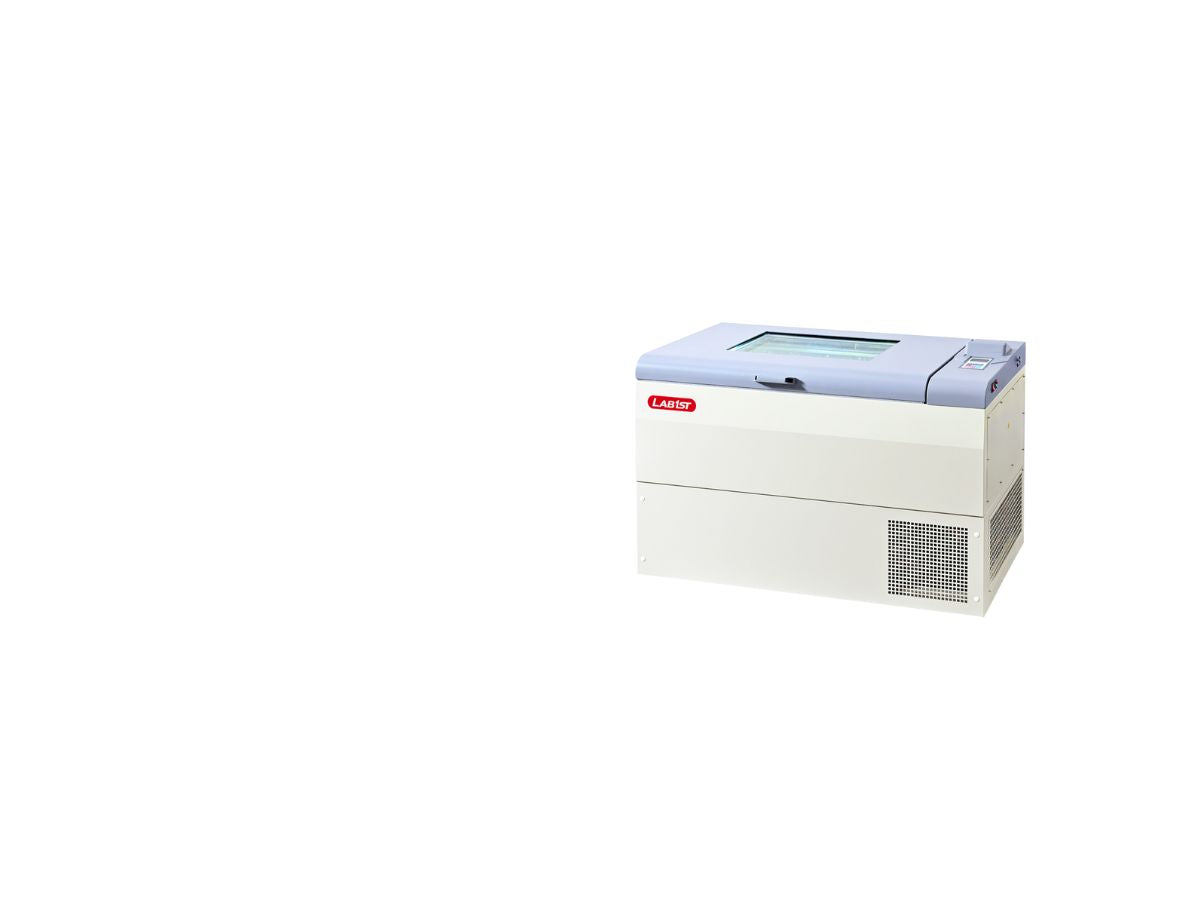 Horizontal Incubator Shaker
Horizontal Incubator Shaker
Horizontal Incubator Shaker
The Horizontal Incubator Shaker is a laboratory device used in the fields of biochemistry, microbiology, and cell culture. It combines the functions of an incubator and a shaker, primarily used for cultivating microorganisms or cells in liquid culture media. It utilizes oscillating motion to facilitate mixing and enhance oxygen transfer efficiency. Characterized by a horizontal shaking mode, it operates within a controlled temperature range and typically includes temperature control and shaking speed adjustment functionalities to meet various experimental requirements.
The Horizontal Incubator Shaker (horizontal shaking incubator) serves the following primary functions and applications in the laboratory:
- Cultivation of Microorganisms and Cells in Liquid Culture Media: It is primarily used for cultivating microorganisms (such as bacteria, yeast, etc.) or cell lines in liquid culture media, providing optimal temperature and shaking conditions conducive to their growth and proliferation.
- Enhancement of Mixing Efficiency: Through horizontal shaking motion, it effectively mixes the components in the culture media, ensuring uniform distribution of microorganisms or cells, and promoting efficient transfer of oxygen and nutrients in the culture.
- Improvement of Experimental Efficiency and Consistency: The shaking motion can be continuously operated under controlled temperature conditions, maintaining the uniformity and stability of the culture, thereby enhancing the repeatability and accuracy of experiments.
- Suitability for Various Experimental Needs: With temperature control and adjustable shaking speed functions, the horizontal incubator shaker is suitable for a variety of experimental conditions and biological research, including biochemistry, microbiology, cell culture, molecular biology, and more.
- Convenience in Experimental Operations: Typically designed with a top-opening hood for easy access and sampling, simplifying experimental procedures and facilitating convenient loading and retrieval of samples.
In summary, the horizontal incubator shaker is a crucial laboratory instrument that provides a stable cultivation environment and efficient mixing capabilities, supporting the growth studies and experiments of various microorganisms and cells.
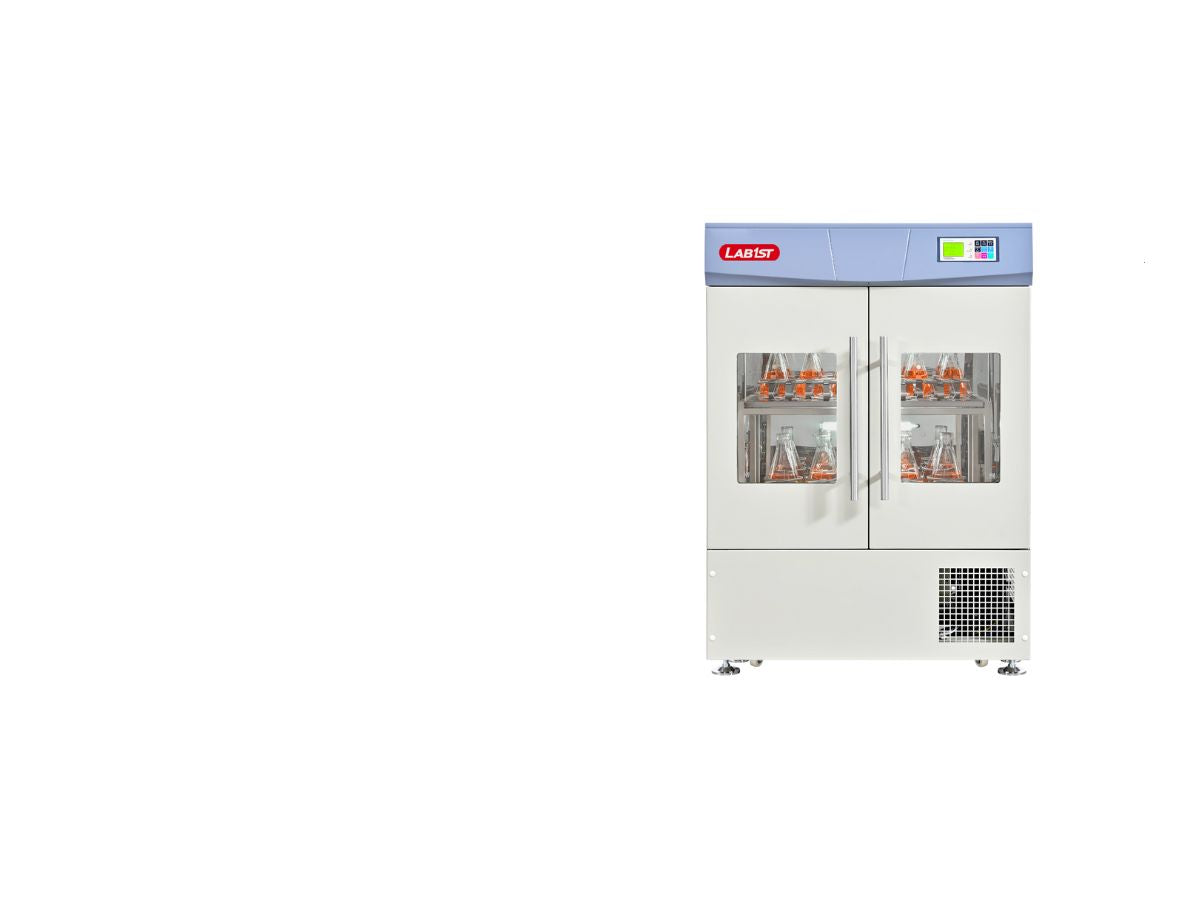 Floor-Stand Incubator Shaker
Floor-Stand Incubator Shaker
Floor-Stand Incubator Shaker
For large volume laboratory cultivations, consider a floor-stand incubator shaker! The LAB1ST ISF incubator shaker is specifically crafted for medium to large-scale cultivation needs. It features a generous capacity with precise temperature and speed controls, along with optional humidity regulation. With 3 different sizes, 3 kinds of shaking throw and up to four different trays, it is versatile enough to satisfy your cultivation needs.
-
Incubation and Shaking Functions:
- Provides stable temperature control (usually above room temperature) for incubating samples. Equipped with a shaking platform that ensures uniform mixing of samples during incubation.
-
High Capacity Design:
- These devices are usually floor-standing and can handle large volumes of samples or larger culture flasks and bottles. Suitable for long-term and large-scale cultivation experiments, such as microbial culture and cell culture.
-
Temperature Control System:
- Equipped with precise temperature control systems that can maintain specific temperature ranges.
- Some models also offer humidity and CO2 concentration control to meet specific experimental needs.
-
Applications:
- Microbiology: Used for the cultivation of bacteria, yeast, and other microorganisms.
- Biotechnology: Used in the expression of recombinant proteins and fermentation processes.
- Biochemistry: Used to optimize various enzymatic reactions and chemical processes.
-
Additional Features:
- Programmable Control: Many devices support programmable functions, allowing users to set different shaking speeds, temperature profiles, etc., to meet the needs of different experiments.
- Safety Features: These devices are often equipped with over-temperature protection, alarm systems, etc., to ensure the safety of experiments.
